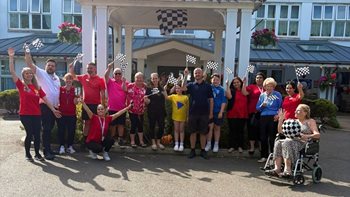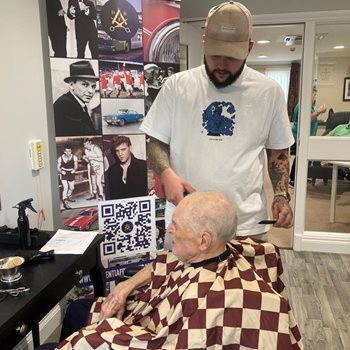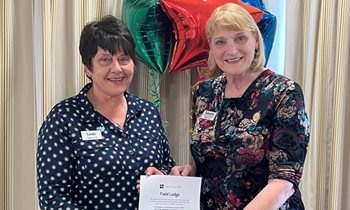This Sunday, 21st September, marks World Alzheimer’s Day.
As part of World Alzheimer's Month, those across the social care sector and beyond will advocate for greater awareness and understanding around dementia.
It is estimated that two out of three people living with dementia in the UK have Alzheimer’s disease, making it the most common form of dementia. At Care UK, around 67% of Care UK residents live with some form of dementia, with approximately 24% of those currently diagnosed with Alzheimer’s disease.
Dementia diagnoses are continuing to rise. These diagnoses not only impact those who will be living with the condition – an estimated one in three people – but one in two people will also be affected by, for example, caring for a family member with dementia. It is currently projected that there will be 1.4 million people living with the condition by 2040.
Jo Crossland, Care UK’s Head of Nursing, Care and Dementia, shares her thoughts around those who are seeking a diagnosis, or supporting their loved one through the process.
Jo is a dual-qualified nurse - having completed General and Mental Health nurse training - and has worked in both fields throughout her career. Her passion for supporting those living with dementia is personal, after her grandad lived with dementia. The experience of families caring for a relative with dementia is currently the topic of her part-time PhD at Leeds Beckett University, where she is researching the experience of families in their journey into care.
Here, Jo shares some of her thoughts for supporting someone living with dementia:
Aim for an early diagnosis
Alzheimer’s disease is the most common illness that causes dementia and is usually first identified through small and subtle changes. These can include memory loss, difficulty concentrating, confusion, behavioural changes and withdrawal from social activities. Other conditions that result in the brain being affected by dementia result in similar but slightly different changes.
Jo explains: “We know that around half a million people live in care homes in the UK, and approximately 70% of residents moving into care homes already have some form of cognitive impairment – which may already include a diagnosis of dementia. This may mean they have been living at home with the condition and have needed the support of their loved ones or their community, often with little in the way of professional support.
“By seeking advice from a GP, as early as possible, a diagnosis can be made, which will increase the likelihood of receiving advice and support for the next stage of the journey. Appropriate medication and lifestyle changes can also help to slow the progression of some types of dementia and can enable a family unit, to plan for the future. This could include joining support groups for people with dementia and their carers in the local area.
Reach out for help when you need it
Jo shares: “Regardless of whether or not you recognise yourself as a carer, this can be a difficult time with a lot of change and complicated emotions. That’s why it’s important that there is extra support available to anyone following a diagnosis of dementia.
“Within Care UK homes, we are proud to regularly host Understanding Dementia events and dementia cafes to provide support to those in the local community, including in learning more about the condition. The cafes are usually monthly and, not only are they a great learning opportunity, but they are a place to share experiences, socialise and gain advice and support from colleagues within our homes who have additional knowledge and skills in dementia care.”
Adopt truly person-centred care
Over the course of her career, Jo has seen every innovation – from red toilet seats to out of context murals at care homes – designed with well-meaning intentions of supporting those living with dementia, but at times causing more anxiety or distress for a person trying to make sense of an increasingly confusing world. Jo is clear that the most powerful form of person-centred care revolves around each resident and their life story. As she comments, without knowing something of each unique person, we cannot hope to support them in a person-centred way.
In addition to a pre-moving-in meeting, at every Care UK home, residents and their loved ones are asked to fill in a ‘getting to know you’ form with a care worker, which details residents’ likes and dislikes, as well as their past jobs, hobbies and important memories.
Jo says: “It’s so important that you don’t lose sight of a resident’s lived experiences when they move into care – they’ve lived a fulfilled life before you’re given the privilege of looking after them, so you need to make sure you know how to make them feel comfortable, safe, and heard. And of course, a person’s story doesn’t stop when they move into a care home, in fact, it’s essential that their life story forms the basis of their support plan for the future.
“This might include keeping residents up-to-date with the scores of their favourite football team, playing their favourite music, catering to their food preferences, or understanding what hobbies or tasks they would like to take up in the home. Would they personally benefit from a gardening club, or would they enjoy helping deliver newspapers to other residents? we have residents who are former dinner ladies, who might want to help to oversee mealtimes.
Jo adds: “When I was starting out in care, there was a resident living with dementia who had owned a nearby farm and worked on it his whole life. After dinner, he would unzip cushions and pull the stuffing out. He wasn’t agitated when he did this, he was always focused and busy – and I always wondered if he thought he was still delivering baby lambs. We always need to remain curious and do our best to understand the actions of residents living with dementia so we can support individuals to continue to live a fulfilling life.”
Within Care UK homes, lifestyle teams work with colleagues to facilitate a range of activities, clubs, and wishes from the Wishing Tree initiative to make sure residents can keep up a beloved hobby or try something new. Whether it’s the creation of a dementia-friendly cinema club or choir, to a poetry or photography class, or working with our chefs to make their favourite childhood recipes – there is something for everyone to enjoy.
World Alzheimer's Month runs throughout September, and dedicated dementia organisations are fundraising and raising awareness of the condition during this time. Many Care UK colleagues have previously taken part in memory walks or treks to raise money for Alzheimer’s Society.


